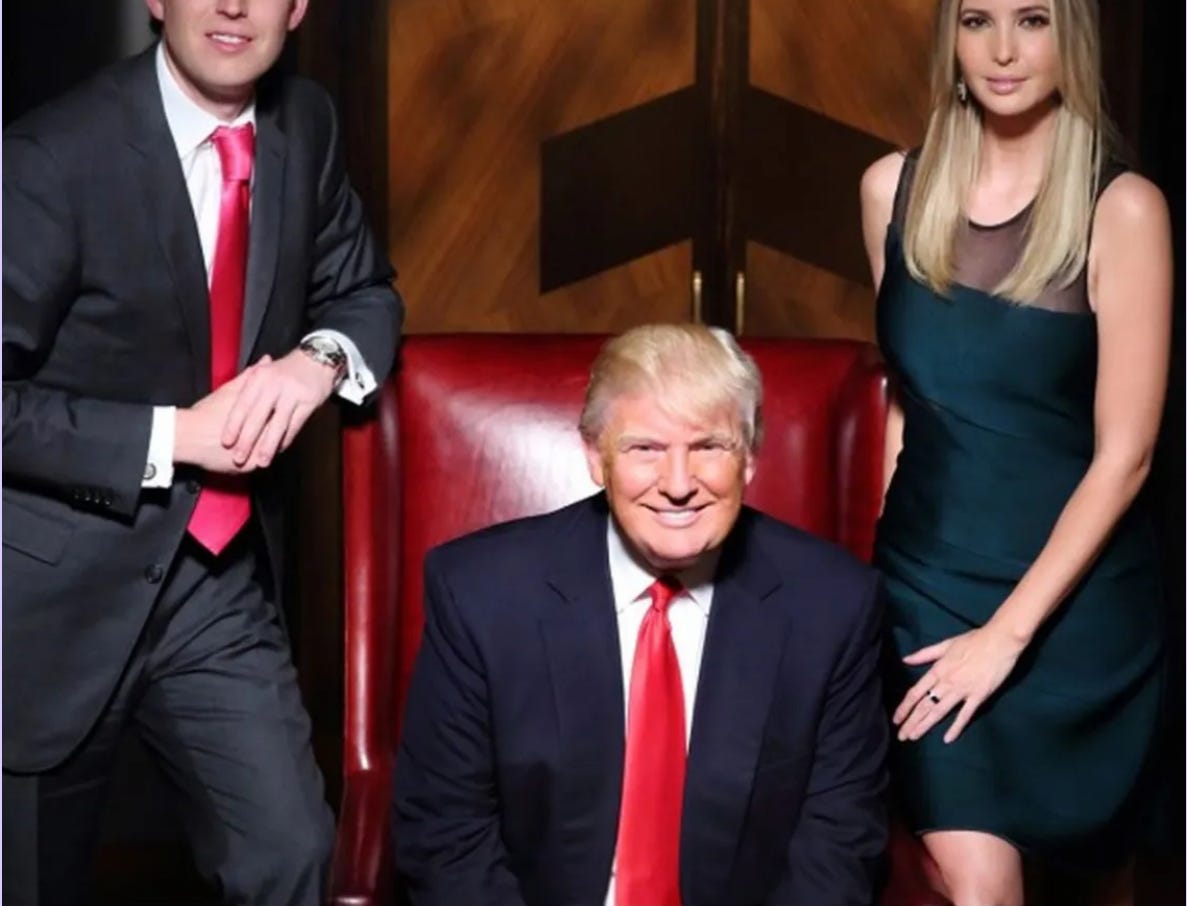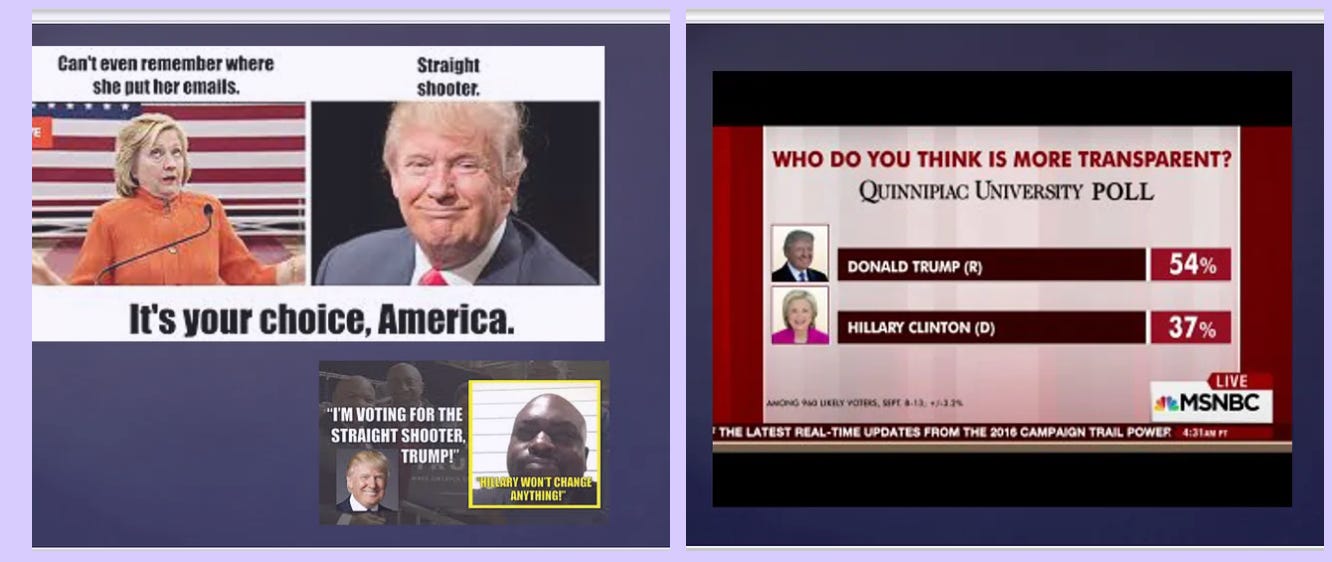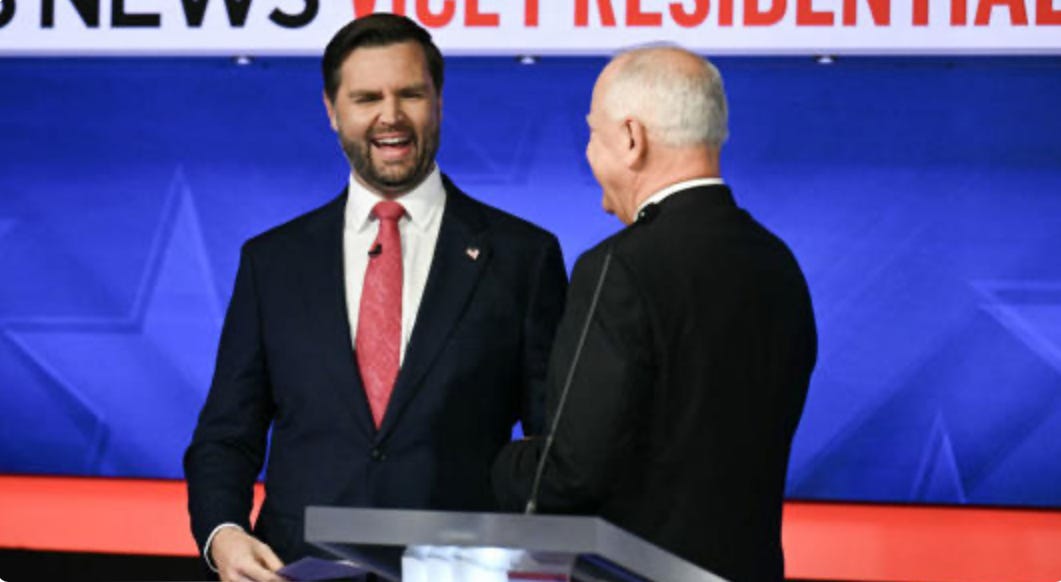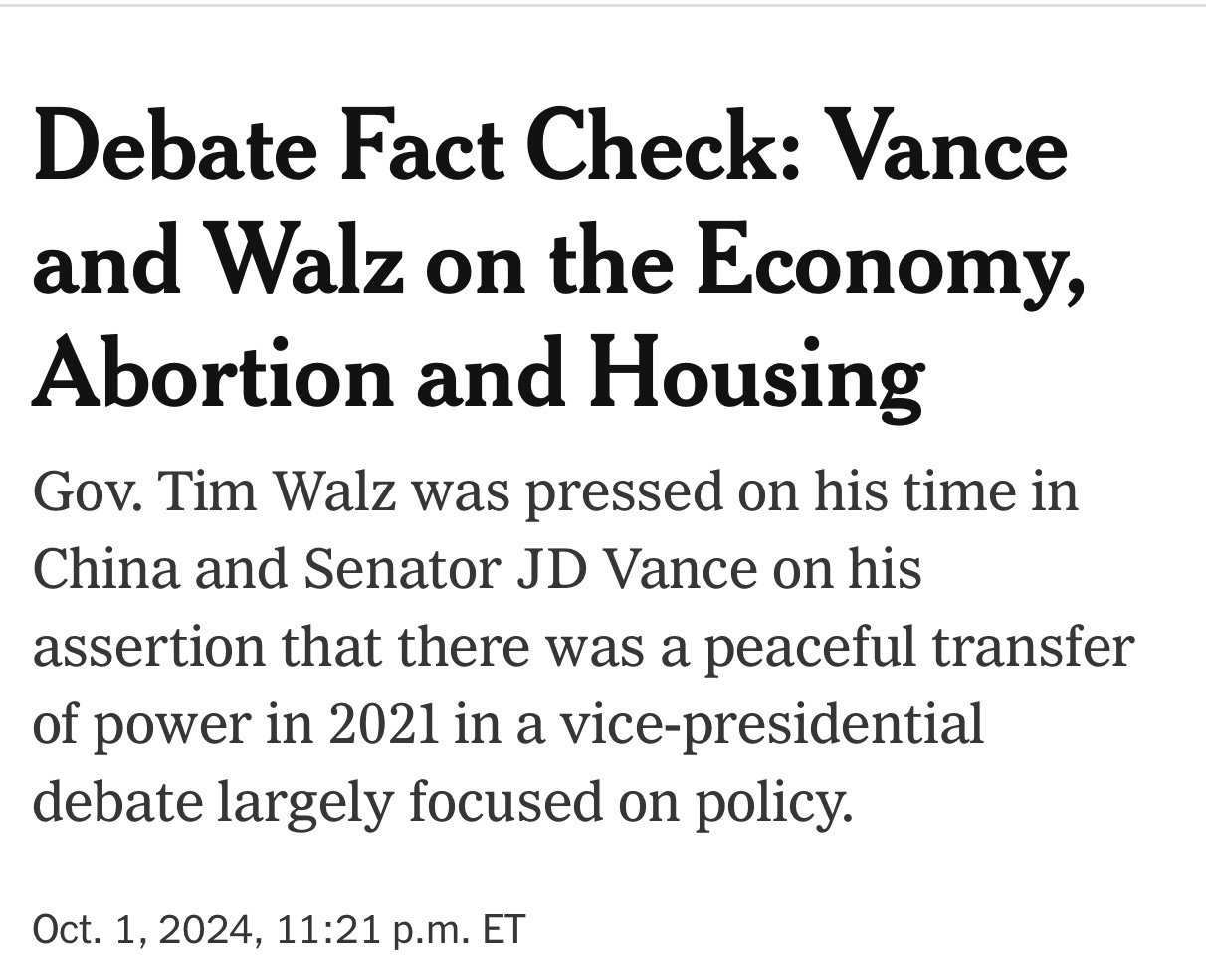The Salesman and the Trickster
Trump is falling apart. But Vance is ready to take over. He’s even more dangerous. And the media still doesn’t get it.
This is the week 11 edition of BordoLines’ “Election Watch.” I hope you’ll consider subscribing—and sharing—and “liking”!!
The Death of a Salesman.
Thanks to television, Trump rose to a position of prominence that would have been unimaginable a few decades ago. Not even Ronald Reagan had gone straight from TV (and in Reagan’s case, movies) to the White House. And Trump wasn’t even a successful actor, but a failing businessman when The Apprentice saved him. That performance and a lot of self-promotion managed to convince a significant number of voters that he would be an able leader of the country.
Trump’s first sell was himself. In the first episode of The Apprentice he addressed viewers: “I’m the largest real estate developer in New York. I own buildings all over the place, model agencies, the Miss Universe Pageant, jetliners, golf courses, casinos, and private resorts like Mar-a-Lago, one of the most spectacular estates anywhere in the world.” And although our collective memories have been re-shaped by the violent rhetoric of his rallies and the real-life violence he encouraged, in those days his tv persona was that of a wise, fatherly, somewhat stern yet dependably rational boss.
That incarnation of Trump was not, as tv critic James Poniewozik describes him, “blunt, impolite,” “bellicose,” and an “apex predator.” He fired most contestants reluctantly, often prefacing the famous phrase with compliments and regrets, and left it to the contestants to provide the squabbling cutthroat relations that viewers had come to expect from those fighting tooth and nail to remain on the island. Trump was famous, in fact, for displaying no animus, just matter-of-fact appreciation of, for example, the importance of branding, or the necessity of holding the project manager responsible. Flanked by Ivanka and Don Jr., far cooler (read: virtually robotic) in their roles as advisors to their dad, they played the unemotional dispenser of business savvy. Trump, on the other hand, was not the snarling boss but the sympathetic but firm manager who hated to punish the contenders, but really had no choice.
When he came down that golden elevator, that persona came with him. It seems unbelievable now, but through much of the 2016 primary, Hillary Clinton was the media’s favorite “liar, liar” and Trump was the honest, trustworthy, “straight-shooter”:
Hillary “derangement syndrome,” which I’ve detailed and analyzed in two books and many articles, did a lot to keep this duality alive. The media, long-harboring resentment against Hillary for her disinterest in engagement with them and annoyed that she was being “coronated” by the Democratic Party, was more than willing to brand her as “secretive” and “untrustworthy.” And Trump seemed so refreshingly accessible; he called Joe and Mika virtually every morning to schmooze amiably, and slurped up every bit of attention the mainstream media fed him.
After Trump was actually elected, the corporate media, afraid to alienate consumers with a too liberal bias and unprepared to cope with Trump’s cascade of lies, helped sustain the illusion that, despite all evidence to the contrary, this was still a normal—if increasingly problematic—presidency. The conventions of television commentators to be upbeat and reassuringly chatty (negativity prompts channel-changing) permitted the most horrific things—from children in cages to multiple violations of the constitution—to be done without alarms being sounded. The corporate media’s vaunted commitment to “balance” (read, in practice: false equivalences) discouraged outright displays of what so many of us were feeling: How can it be that this is our president? How can it be that he’s lasted for so long? Increasingly, watching The Trump Show was not like watching a reality show (as pundits frequently labeled his presidency) but a surreality show. And the dissonance between what many of us were feeling and the illusion of normalcy that the mainstream media projected made it all the more surreal.
A key to understanding Trump is that, like all salesmen, the advertisement is the currency of the sell. From an early age, he’s never operated on the register of true/false—that distinction has no meaning for him. What has meaning is whether you can sell it. And, like a true Ad Madman, you try things out and see whether they work or not. You come up with what “feels” like a winning pitch, what makes your product look good. You stick with what works and revise what doesn’t. The reality-whiplash that gets created—a recent example: his changing positions on abortions—turns the press into a serial kaleidoscope that keeps people more disoriented than informed.
For Trump, everything—even the mug shot that brands other people negatively—is an opportunity to merchandise. The media has been both naive and cooperative in this, blasting the mug shot over page and screen, imagining that it would brand Trump as a criminal. Trump knew better. He’d adopted a pose that would be iconic and ready-made for selling him as a warrior.
Trump may still be selling (increasingly weird) merch to his MAGA supporters. But the product that isTrump himself seems to be nearing the end of its shelf-life. His pitches are incoherent, desperate, begging—and whatever savvy he once had about how to appeal to whom is collapsing. It’s hard to believe that even his most avid female supporters didn’t cringe when he tried to sell his (then latest, since altered) position on abortion as though it was a body-sculpting product promising women that it will transform their lives, making them “happy, confident, and free.”
The King May Be Dying, but Beware the Trickster1
In mythology and the study of folklore and religion, a trickster is a character in a story (god, goddess, spirit, human or anthropomorphisation) who exhibits a great degree of intellect or secret knowledge and uses it to play tricks or otherwise disobey normal rules and defy conventional behavior…Tricksters, as archetypal characters, appear in the myths of many different cultures…The trickster crosses and often breaks both physical and societal rules…disrupting normal life and then re-establishing it on a new basis.…
Often, he is a shapeshifter.
(Wikipedia)
I watched the Vice-Presidential debate this past week becoming more and more upset. I wasn’t upset with Walz’s nervousness or failure to deal knock-out punches to Vance. I was upset—actually, creeped-out is more accurate—by those qualities of Vance’s that got him the praise of commentators: his seeming reasonableness and lack of dogmatism, his civility, his “niceness.”
I had expected slick, I expected cunning. I expected lies. But I hadn’t expected a smarmy gesture of sympathy toward Walz over his Walz’s son’s viewing or a school-shooting. Or the shameless “softening” of the worst Trumpian positions. I hadn’t expected Walz to find himself voicing agreement with statements that, indeed, were difficult to disagree with. Vance was good, really good. It was an almost perfect impersonation of the kind of non-Magafied Republican that the old-school GOP and those Trump voters who had become a little disenchanted with the deranged salesman had longed for.
Gag me.
And pass me the Xanax.
For how many viewers, I wondered, was this carefully crafted performance their introduction to Vance? And if so, would political commentators, who surely knew better than to be conned by it, expose it for those who hadn’t been following Vance over the weeks since Trump chose him as running mate? You know, the Vance who urged abused women to stick with their marriages? Who defended maligning Springfield’s Haitians? The guy who couldn’t even converse comfortably with a donut-maker?
The Big Story about the debate, surely, would be “Who is this guy and where has he hidden J.D. Vance”?
Nope. Instead, we got various versions of the following:
1. The New York Times’ normalizing “fact-check” in which Vance’s outright lies are presented as “needing context” and Walz’s harmless fib about when he was in China is compared to Vance’s “assertion that there was a peaceful transfer of power in 2021.” False equivalence, much?
2. Praising Vance’s debate “performance” until he blew it on the very last question, as in The Atlantic’s description:
“For more than 90 minutes, J. D. Vance delivered an impressive performance in the vice-presidential debate. Calm, articulate, and detailed, the Republican parried tricky questions about Donald Trump and put a reasonable face on policies that voters have rejected elsewhere. Vance’s offers were frequently dishonest, but they were smooth.
And then things went off the rails.”
Yes, the last question exposed Vance’s crucial and some would say disqualifying refusal to admit that Trump lost 2020. But it’s not as though his “answers” up until then deserve praise.
Does a skillfull con-job deserve praise?
Does pretending you are someone who you are not deserve praise?
Is “impressive” an accurate way to describe the performance of an amoral trickster who put on a totally fabricated role for the occasion?
It misrepresented him, it misrepresented Trump, it was dangerously deceptive for viewers who hadn’t followed him over the past weeks and only “got to know him” through the debate, and it was stuffed with lies, evasions and “damning non-answers” (as Walz called his last response.)
His entire presentation of himself and Trump needed a “fact-check”: FALSE. And by that I mean the man himself. FALSE.
This narrative of “cool, calm, articulate” etc. until the one “Big Moment” relieves the media of diagnosing and discussing the kind of man Vance is. Which is as dangerous—perhaps more—than the falling-apart Trump.
3. Blaming Walz for not punching harder.
Sure, there were several points at which I wish he had called Vance out more directly and forcefully. But then….I’m talking to you journalists and commentators now—why DON’T YOU DO IT YOURSELF? That is, why is Tim’s failure the headline? Why aren’t Vance’s evasions, lies, and phony presentation of himself the Big Story? By making Walz your Story, you’re normalizing a dangerous man—just like you did time after time with Trump.
Not dangerous, you say? “Just” the VP, you say? I shiver a bit when saying it, because I’m virtually the same age as Trump, but things can happen when you’re our age. And even if he remains physically healthy or some would-be assassin doesn’t have better aim, Trump is clearly psychologically and cognitively (not to mention ethically) impaired, disordered, incompetent—I don’t care what exact diagnosis you prefer, something disastrous is going on there.
And who is waiting in the wings? Vance is not only smarter and younger than Trump, he’s bankrolled and promoted by Project 2025–virtually the brainchild of Project 2025, perfectly groomed (eyeliner included) to be head of a future techno-authoritarian state. For now, he’s passing as a “nicer-than-Trump” Trump. We saw his inaugural emergence at the VP debate.
4. Complimenting the debate for the “civility” of the discourse. This wasn’t civility. It was one man duplicitously and cynically performing being reasonable and nice, and the other man—who truly is reasonable and nice—being (overly) generous. And perhaps Walz was also a bit surprised, and taken off guard. Understandable, I think. He was “debating” an artfully constructed android. Who managed not to malfunction until the very end. Thank goodness his gears finally did go off the rails.
The devil can wear a pleasing face. That’s how the trickster operates, too.
It’s up to commentators, journalists, the media—anyone who has words, voice, presence—to take the mask off. So far, I’m not seeing it.












Excellent summary. My take: Vance is the lipstick on the pig.
I'm so disappointed with the way journalists have normalized Trump's campaign as though he had a serious desire to govern. He does not. Vance is the greatest danger here. If Trump's elected, chances are good we'll end up with a President Vance within the next five years. He's soulless.